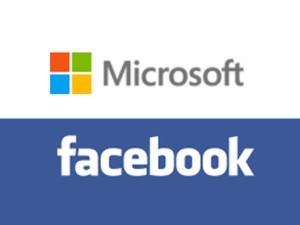Facebook, Microsoft bare US data requests

The two companies have come under heightened scrutiny since word leaked of a vast, covert Internet surveillance program US authorities insist targets only foreign terror suspects and has helped thwart attacks.
Facebook said Friday it had received between 9,000 and 10,000 requests for user data affecting 18,000 to 19,000 accounts during the second half of last year, while Microsoft said it had received 6,000 to 7,000 requests affecting 31,000 to 32,000 accounts during the same period.
But those requests include criminal warrants, subpoenas and other orders, and both firms said they were prohibited by law from listing a separate tally for security-related requests or secret court orders concerning terror probes.
Release applauded
The Center for Democracy & Technology applauded the release as an “important step” but urged the government to allow the companies to release further details.
“We welcome this new information and thank Microsoft and Facebook for it, and will also continue to press for more information,” the Internet freedom group’s senior counsel Kevin Bankston said in a statement.
“We call on the Justice Department to allow such transparency reporting now, and for Congress to update the law to guarantee the right to engage in such reporting in the future, and we hope that the entire Internet and telecommunications industry will join us in that push.”
Microsoft’s deputy general counsel John Frank acknowledged that “what we are permitted to publish continues to fall short of what is needed to help the community understand and debate these issues.”
The orders, which could only be disclosed in increments of 1,000, affect just a “tiny fraction of Microsoft’s global customer base,” he added.
‘Not all requests complied with’
Facebook’s general counsel Ted Ullyot insisted the popular social network with over a billion members had “aggressively” protected users’ privacy and had not complied with all the requests.
“We frequently reject such requests outright, or require the government to substantially scale down its requests, or simply give the government much less data than it has requested. And we respond only as required by law,” he said.
Google, which already publishes a “Transparency Report” on such requests, has, meanwhile, asked the FBI and US Justice Department for permission to release separate tallies related to security probes, saying it has “nothing to hide.”
Major Internet firms have faced a public backlash since government contractor Edward Snowden leaked details of PRISM, a vast program that saw nine companies turn over user data to the US National Security Agency.
Leaked details of the program—first published by Britain’s Guardian newspaper and The Washington Post—have reignited debate over the trade-offs between privacy and security more than a decade after the September 11 attacks.
Apple, Yahoo deny claims
The companies, which also include Apple and Yahoo, have denied claims the NSA could directly access their servers. US authorities have said the program was legal and limited.
FBI Director Robert Mueller told lawmakers this week that the program could have prevented 9/11 and said the leaks had caused “significant harm to our nation and to our safety.”
He also confirmed that Snowden was the subject of a criminal investigation.
Snowden, a 29-year-old IT technician, has gone to ground in Hong Kong, where he had surfaced for media interviews after the leaks were published. He has vowed to contest any extradition order in court.
Hundreds of protesters staged a rally in rain-hit Hong Kong earlier to urge the city’s government to reject any request to extradite Snowden and to criticize the US surveillance programs.
Snowden told the South China Morning Post newspaper this week that there have been more than 61,000 NSA hacking operations globally, including targets in mainland China and Hong Kong.
The United States has yet to file a formal extradition request to Hong Kong, a former British colony that retained its separate legal system when it returned to Chinese rule in 1997.
Beijing ultimately retains control over defense and foreign affairs but China and Hong Kong’s governments have yet to comment on Snowden’s case.—Joseph Krauss